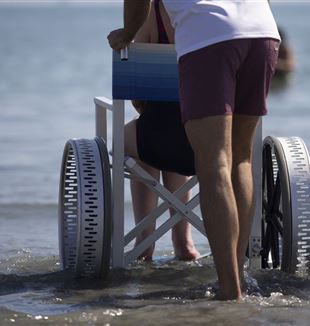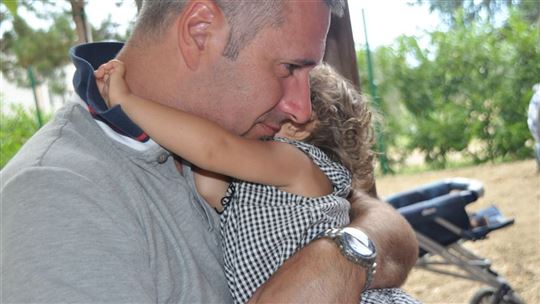
The wooden cross by the sea
A bathing establishment for the severely disabled on the Ravenna coastline. Born from the story of Dario and Debora and many friends, also from ALS and his death.“Loneliness is the real disease to be cured in people with a terminal diagnosis. That is why we all have a great task: to lighten the load of these patients and their families, supporting them along the way.” This is a burden that would be impossible to bear alone, but if shared can become a softer and lighter yoke. It is also “an opportunity to discover that the person is never defined by their illness, not even if it is very serious and terminal, because they have a desire for life within them that must be cultivated.” Debora Donati knows this well. Very well. Debora is 47 years old from Faenza (Ravenna) and has three teenage daughters (or almost). She likes to use this metaphor: "That of a big wooden cross, a very heavy cross that no one can support alone, let alone lift. But if other people come under this cross, it becomes much lighter. For five years," she says, "my family and I only leaned on this cross because others carried it with us and for us. They were and are our friends, who continue to support us even today on this path." Which unpredictably became a way to help other sick people by the sea.
Those five years of which Debora speaks refers to the years of her husband Dario Alvisi's illness. In February 2013 he received “the ferocious diagnosis”: amyotrophic lateral sclerosis. “A terminal disease is not an incurable disease, because it is the person as a whole that needs to be treated. That is why from the very first moment we wanted to support that desire for life that Dario never lost,” Debora recalls today. A gushing desire, a superabundance of good lived with family and friends, transmitted to so many people. Already in September 2013, just eight months after he received his 'sentence' at a Milan hospital, Dario found himself immobilised in bed. He needed help with everything, and was totally dependent on others. He had loved sports and the mountains, he was having a lot of success at work (he was the administrator of an important catering cooperative), and could 'boast' of a beautiful family, and many friends. "Everything was going well, everything seemed perfect, then that slight limp of one of Dario's feet, a seemingly trivial symptom instead turned into something quite different," says Debora.
Yet that “fierce diagnosis” carries within it the seeds of hope. It is not a condemnation, as one is often led to believe: “When Dario was diagnosed with ALS, I was a guest of a family in Milan. I will always remember that in those days, which were very difficult for me, a lady gave me the Divine Mercy chaplet that was dear to John Paul II, the Pope with whom we grew up as a couple. She told me that she would accompany me; I do not know why, but I immediately felt relieved. Since that day, we have not stopped."
For Dario and Debora (and for their daughters Caterina, Carolina and Camilla) "we have not stopped "means that a new life began from that day "which continues even today that Dario is no longer here with us," Debora continues. "He always manifested a great desire for life, he wanted to live above all to be at his daughters' side for as long as he was allowed. He suffered a lot, at times a lot, because this disease is relentless, but he always coped with everything with the support of family and friends, and the fundamental contribution of doctors, nurses and health workers.”
On March 9, 2013, less than a month after the “fierce diagnosis”, Dario and Debora got married. "We are believers and practising believers,” she explains, “but perhaps we did not understand the meaning of that sacrament because we reduced it to the party, the guests, the favours... Instead, when on that day in church, with our daughters, our witnesses and closest relatives, I said that 'in health and in sickness', I understood why Someone had allowed me to wait so long to get married. To understand the true meaning of that sacrament.”
"During the years of his illness, Dario was always our centre of gravity. Precisely for this reason, we were worried that we would not be able to fulfil a great wish of his: a holiday together at the seaside.” In Romagna at the time there were no facilities available to accommodate patients like Dario. So that desire for life, for a full life also made up of good times, brought the family in the summer of 2017 (“after an incredible 800-kilometre journey”) to the beaches of San Foca di Melendugno, in Salento, to the 'Terrazza tutti al mare!' bathing establishment equipped for the severely disabled by the 'Io Posso' association. "Having returned from that wonderful experience, we asked ourselves: why not do something similar in Romagna too? Why not also allow Dario and people like him to spend some time here on the Riviera?" says Debora.
The rest is the incredible story that has developed in the last few years, that of the 'Insieme a te' association in Faenza, founded in 2017 and still directed by Debora, which in 2018 opened a bathing establishment dedicated to people with severe disabilities in Punta Marina Terme, on the Ravenna coastline. From the first 6 stations, it now has 18 with the possibility of accommodating up to 400 people, with 7 flats managed for families. In the last few weeks, with the laying of the foundation stone by the Minister for Disability Alessandra Locatelli, the project "Il mare insieme a te-La spiaggia dei valori" (The sea together with you-The beach of values) was launched, supported by the Emilia Romagna Region thanks to funding from the Presidency of the Council of Ministers-Ministry for Disability, to make this very special holiday resort even more welcoming and inclusive.
Read also - Human dignity according to the Church
Some dates punctuate this story and help give it even more meaning. "On March 30, 2018, we were contacted by the offices of the Region: they told us that the project had been approved and that we would be able to build the beach that summer. It was Good Friday, and Dario's condition was worsening by the day. By his own will he was discharged from the hospital where he was hospitalized. He wanted to spend his last days at home.” And it was there, accompanied by his wife and daughters, that Dario passed away on April 2, 2018, Easter Monday, the anniversary of the death of St John Paul II. “Since then,” Debora concludes, “we have not stopped and today I find meaning in everything that has happened to us: there is a greater design conceived for us as a special gift, a design that every day must be welcomed as a great miracle. And it is this passion for life that is the great legacy that Dario left us and that we want to bring to everyone. This beach, which Dario did not even see, is a tool to be able to tell the sick people we meet that yes, life is worth living because we are not alone and we have a value that surpasses any illness.”